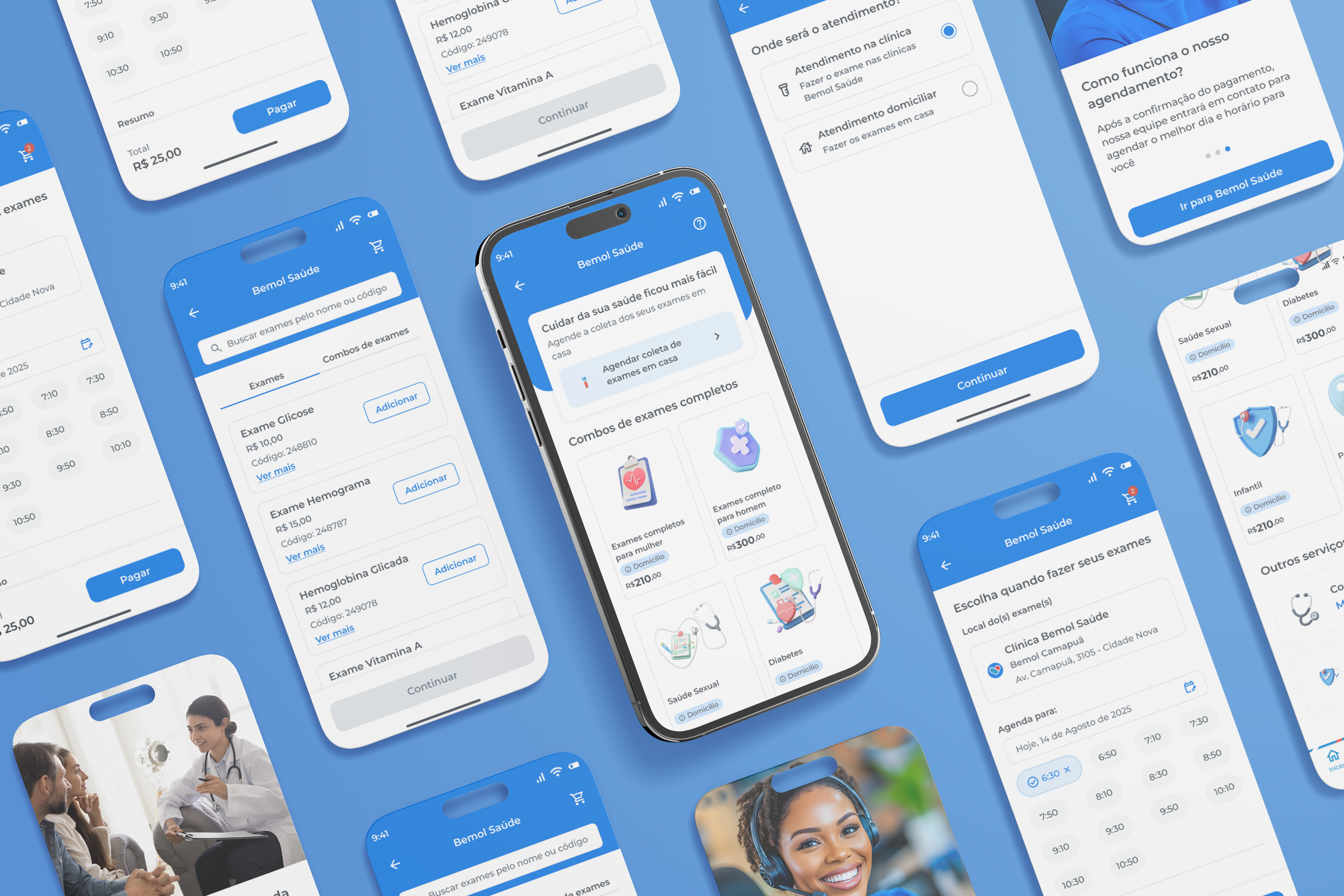Bemol, a leading retail and e-commerce platform, was strategically expanding its physical footprint into healthcare services. The challenge was to bridge the customer trust established in the physical clinics with a seamless digital booking experience, centralizing this new omnichannel service within the primary Bemol application.

Bemol was expanding its physical footprint into healthcare services, necessitating a seamless digital scheduling experience to maintain high customer trust. The strategic goal was to leverage the company’s strong regional reputation to create a new, profitable service vector, offering accessible, low-cost exams and consultations. This translated into a critical UX goal: to design a flow that could handle the complexity of coordinating different service types and logistics, including the novel, buffer-dependent in-home collection service, while guaranteeing the clarity and reliability essential for retaining customer confidence in the brand.
The core design problem was solving a complex logistical puzzle for the first time within the
Bemol application ecosystem: Creating a reliable and scalable scheduling pattern.The design challenge required overcoming the following:
The flow had to seamlessly accommodate two fundamentally different services: Medical Consultations (variable duration) and Lab Exams (fixed time), without fragmenting the user experience.
The "Atendimento Domiciliar" (in-home collection service) involved coordinating mobile teams using Uber transport, which imposed a non-negotiable 1-hour buffer between appointments to account for travel and service time.
The design solution focused on Capacity Management through Abstraction.We developed a new interaction pattern that masked the logistical friction (transport, buffer time) from the user.
The final system was engineered to only surface safe, reliable time slots (as seen in Bemol saúde-3.png) that had already pre-calculated the necessary 60-minute buffer and routing.
This approach allowed the interface to deliver a promise of simplicity and convenience, while the underlying design acted as a capacity and resource manager, all while solidifying a new,
scalable scheduling component for the company's Design System.
The project's success is tied to solving the core UX friction and achieving strategic adoption. These are the key performance indicators (KPIs) expected upon launch:
The primary KPI for this project is the Appointment Completion Rate (Target: 75% to 80%).
Given that this is the first complex scheduling functionality to be integrated into the app,
the most crucial metric is to validate the effectiveness of the new UX pattern in reducing design friction.
The flow was specifically designed to conceal the complex logistics from the end-user. We expect this simplicity
to drive a high conversion index, ensuring that the majority of users who initiate the process successfully complete
the booking and payment without drop-off.
Beyond direct conversion, we focused on two secondary metrics that measure strategic value and service quality.
The first is Domiciliary Service Adoption (Target: 25% to 35%), which validates the success of our convenience strategy
and confirms that the strength of the Bemol brand extends into the customer's home environment. The second is the Service
Net Promoter Score (NPS) (Target: Above 50), essential for ensuring that the digital experience is not just functional, but
also high-quality, thereby reinforcing customer loyalty and the overall reputation of Bemol Saúde.
Key Takeaway: The project demonstrated the critical skill of translating internal logistical constraints into external user simplicity. The successful creation of the new scheduling component positioned the app to easily accommodate all future service-based offerings.
Next Steps (If Approved for Development): Focus on value-add integrations, specifically connecting the scheduling platform to major health insurance plans (e.g., Amil) and creating a seamless post-booking tracking experience for domiciliary collections.